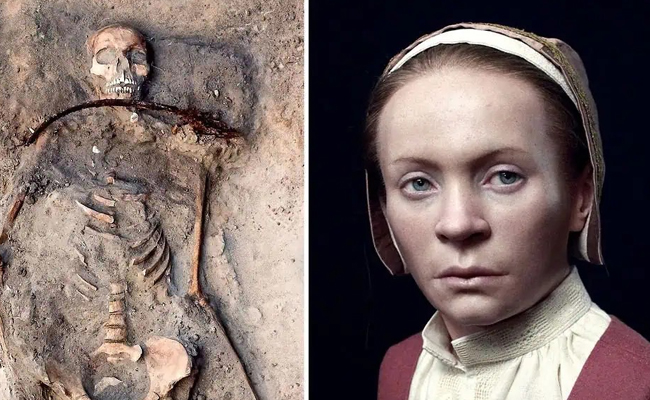Pien: Scientists have unveiled the reconstructed face of a woman known as Zosia, who was buried over 400 years ago in Poland and labelled a vampire by the local community.
The remains of Zosia were discovered in 2022 by a team of archaeologists from Nicolaus Copernicus University in an unmarked cemetery in Pien. Archaeological findings indicated that she was buried with a padlock on her foot and an iron sickle across her neck, as reported by Reuters. Among other bodies found at the site was a “vampire” child buried face down, similarly padlocked.
The research team found that items such as the sickle, padlock, and specific types of wood found at the grave site were believed to possess magical properties intended to protect against vampires.
"It's really ironic; these people burying her, they did everything they could in order to prevent her from coming back from the dead. We have done everything we can in order to bring her back to life,” Swedish archaeologist Oscar Nilsson was quoted as saying by the news agency.
Nilsson noted that Zosia lived during a tumultuous time in 17th century Europe, a period marked by war and widespread fear, which likely fuelled beliefs in supernatural creatures. Aged 18-20 when she died, analysis of her skull suggested she may have suffered from a health condition that caused fainting and severe headaches, as well as possible mental health issues.
In a Facebook post, Nilsson shared that, according to legend, Zosia was initially buried only with a padlock. However, when villagers began experiencing a series of unexplainable bad luck, they felt compelled to take additional precautions.
"They opened her grave, found the padlock now open, and in great panic placed the sharp blade of a sickle over her neck," Nilsson wrote. "In case she would arise," he added.
The reconstruction process involved creating a 3D printed replica of Zosia's skull, followed by meticulously layering plasticine clay to recreate her facial features.
Nilsson aimed to bring Zosia back “as a human” rather than as the “monster” she was buried as. He expressed that it is emotional to watch a face coming back from the dead, especially when one knows the story of this young girl.
Let the Truth be known. If you read VB and like VB, please be a VB Supporter and Help us deliver the Truth to one and all.
Kalaburagi: Four men have been arrested in Kalaburagi on charge of hacking a man with lethal weapons and pelting stones at him under the limits of Station Bazaar Police Station recently.
According to police sources, Anand Jalak Shinde (34), Ashitosh Jalak Shinde (30), Imran Mehboob Sheikh (28) and Sohaib Anwar Qureshi have been arrested. The men are accused of the brutal murder of Syed Mehboob, a resident of Station Bazaar Upper Line Hamalawadi in the city.
An FIR was filed by the Station Bazaar Police Station based on a complaint given by Syed Ismail, father of the deceased Syed Mehboob.
Following quick probe, the police team successfully arrested the suspects within 24 hours. The arrested men were produced in court and have been sent to judicial custody.
The City Police Commissionerate has appreciated in an official release the police team’s quick solving of the murder case and arrest of the four men accused of murdering Syed Mehboob.





